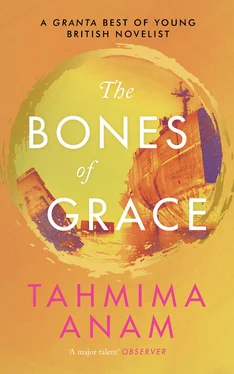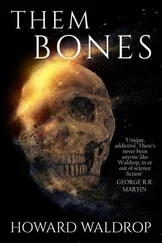It was dusk by the time we set off, carrying plastic tubs of leftover chicken curry and dal. A cool breeze rustled the tamarind trees as we walked down the path to the car. I was feeling refreshed; Belal’s story would make it into our film, and though it wouldn’t bring his daughter back, it would be something. I was finally making some headway, not just with this project but with my life. The film would be no replacement for Diana, for Zamzam, nothing against the death of Belal’s daughter, but at least I could chalk up one small accomplishment, one attempt at making a dent in the world.
As we drove south to Sithakunda, I spotted a clearing in the highway. There were a few cars parked on the side of the road, and beyond, a stretch of beach. ‘That must be Patenga,’ I said. ‘Shall we stop?’ Gabriela was thrilled at the possibility of a swim, though disappointed when I told her she would have to go into the water more or less fully clothed. ‘You can roll up your trousers a little,’ I said, ‘but don’t go above your knees.’
The beach was crowded by women in shalwar kameezes who dangled their babies over the water. We lay on our stomachs and let the tide nudge us gently towards the shore. In the distance, we heard the sound of a flute among the cries of the gulls and the shrieks of the children. ‘This isn’t so bad,’ Gabriela said, her shirt ballooning beneath her. ‘The water is delicious.’ As the sun neared the horizon, we climbed onto a large rock on the shore and waited for our clothes to dry. ‘I never want to leave,’ I said, and Gabriela nodded.
Finally we decided it was time to go. Gabriela had parked in front of a small line of shops. The car came into view and she was jostling the keys in her hand when we saw a man walking purposefully towards us. He stopped and said, ‘Megna.’ I thought he was calling to someone behind me, so I brushed past him, but he turned and raised his voice. ‘Megna, Megna!’ Gabriela took hold of my arm and we were almost at the car, but he followed and came right up to my face. I found my voice and I asked him what he wanted. ‘Don’t you know me?’ he said. I shook my head and tried to push him aside, and that’s when he did it. He put his hands on my arms and turned me around and held me where I stood, his fingers digging into my flesh. I shouted at him to let go. ‘Megna,’ he said again, ‘don’t be angry.’ He was saying ‘Megna, Megna, Megna’ and I was trying to wrestle out of his grip, and then a few seconds later Gabriela was shouting too, and when he heard her voice the man let go and looked over at Gabriela, and then he looked down at my clothes, my long-sleeved tunic and jeans, and he stepped back, his hand over his mouth. ‘Allah,’ he said, shaking his head, and he turned around and I watched him sit down, right there on the road. Another man came out and dragged him away, and they disappeared into a barber-shop. I bundled myself into the car and cried as if this man had beaten me, punched me straight in the face and broken my nose.
It was him, Elijah. It was Anwar. I can’t imagine what he must have felt, believing I was the woman he had been searching for, only to realise I was nothing more than a stranger. And he must have been afraid, because I could have had him arrested. In fact, once I was home, I called Rashid and that’s exactly what he told me to do: file a report with the police. We argued; I said the man hadn’t really done anything, and Rashid told me I was foolish for always feeling sorry for people who didn’t deserve it. Then he said he was leaving for a business trip to China and that he’d be gone for a few weeks, maybe even a month. Did I want to see him before he left? No, I said, angry now because he was so quick to throw a man in jail, and perhaps anticipating another, worse argument we would someday have about this very man. ‘I’ll see you when you get back,’ I snapped, and put the phone down.
This is how Anwar jolted himself into my life. By accosting me on the street and insisting I was someone else. I quickly forgot the woman’s name. Megna. Nothing to me, right? Nothing but everything. But that’s for later. Don’t blame me for parsing out the story slowly, Elijah. These things take time, and I seem to have all the time in the world, because you never appear at the traffic lights any more; I’ve sometimes waited at the coffee shop across the street, reading Anna Karenina and looking up every few minutes to see if I’ve conjured you, but there’s no trace of you there or anywhere else in this cold, cold city.
You are about to arrive on the beach, and the very best and the very worst things are about to happen. These memories, if you choose to linger on them, will be the ones that pain you most. The ones that will make you want to stop, burn this letter, and never think of me again. So, before you read on, read this first: another love story, another quest, that of Anwar, a man who both rejected and accepted his fate, a man who protested silently, for his whole life, against the many injustices the world had decided to mete out to him. Read him gently, dear Elijah; let your gaze on this page soften; remember that he had nothing to do with my treatment of you, so regard him with kindness and judge him like the innocent he is.
The Testimony of Anwar I How I Got Everything
Foreman likes to hoist the new ones up, see what they’re made of. Some of them have never climbed higher than a tree in their village. Back home the place is flat, flat. I’m here nine years, I know what’s what, so I tell them, don’t look, don’t look. Hold the torch in one hand, like this, and keep your eye on one screw at a time. From here to here, I show them, holding my fingers apart an inch, maybe an inch and a half. Your eye will see this much, no more. Understand?
I don’t tell them the whole story. Whole story is this: you look down, you die. You see the world has shrunk below you. You call God but no one answers. You recite the Kalma. You see God is not there. You piss your pants. No one is watching. No one cares about your shitty speck of a life. The people below are specks and you are a speck. God looks down and sees nothing but tiny ants below Him. You choke. You move your legs. You scream. The building shifts, it moves, it throws you up, it throws you over. You’re done for, a chapatti. They scrape you off the pavement; they don’t even write to your family. Months later, someone will go to your village and tell the news to your people. And that will be the end of your life.
All this I don’t say. I say only what is useful.
This new kid won’t listen. Came in with a swagger — I spotted it right away, the way he moved his legs and his trousers hanging, his head loose on his shoulder, nodding, doesn’t look down when foreman is talking, raises his head and gives two eyes to the boss. Eye for an eye. Foreman smiles. I know that smile; it means I’ll take that two-eyed look right out of your skull. Soon you’ll be like the rest of them, giving me the top of your head and mumbling into your shirt.
‘I have schooling, sir,’ the kid says. ‘Intermediate Pass.’
Foreman says, ‘Crane will take you to the top.’ And the kid says, ‘ Yessir .’ as if he’s been given a gift. All that school, he doesn’t even know when his ass is being strung up.
Later I ask the kid where his people are. We’re on the same sleeping shift, starts two in the afternoon, the shed hot as an animal’s mouth. You can’t touch the metal rails on the bunk, you just jump on the mattress and pray for a breeze.
He says he’s a Pahari, says it with a little edge, like, I’m a Pahari, you gonna fuck with me? I’ve never seen such pride in a tribal, and I say, ‘So what, no one cares here.’
Army took our village, so I had to come here, make some money. He shrugs like he doesn’t mind but I can see when he closes his eyes he’s going to dream about college, hearing his name in the roll-call, getting his degree and spending his life in a shirt with buttons and getting some respect. Someday, someone might even call him ‘sir’. Buy a scooter and get himself a salty wife.
Читать дальше












